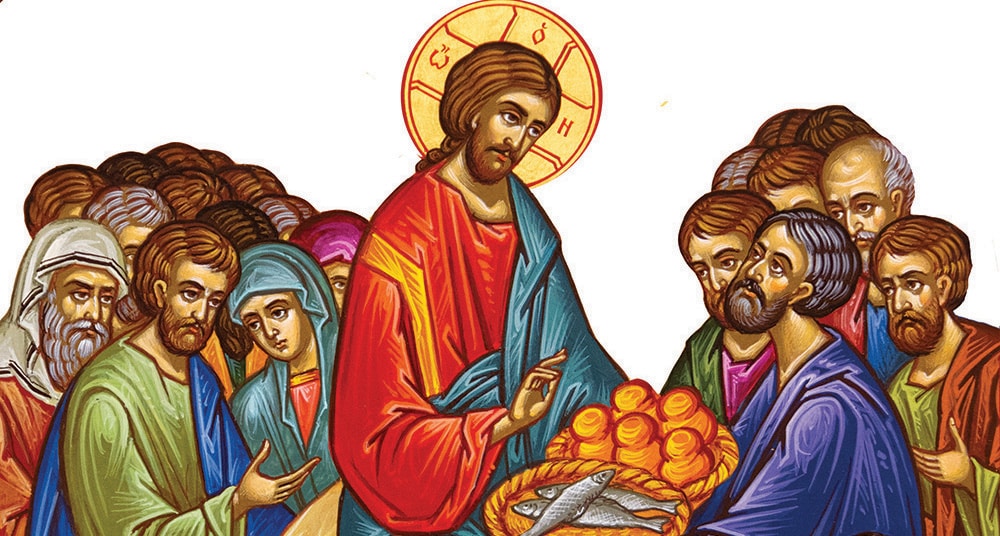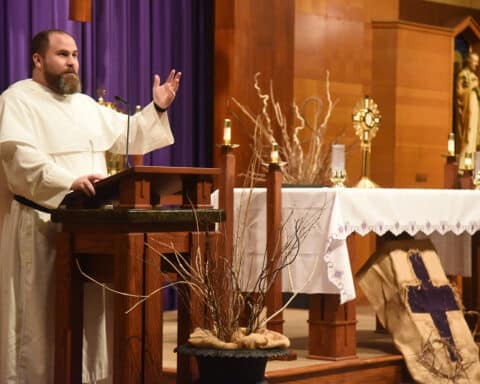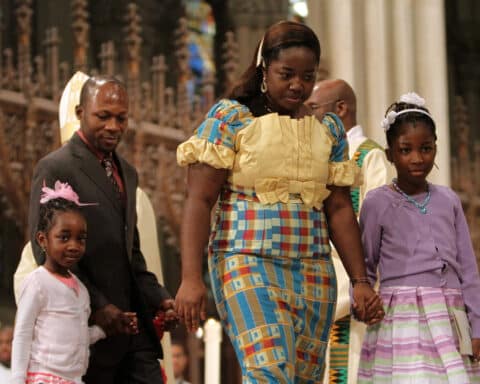This is the eighth in a 12-part series looking at the life of Christ.
When speaking of Jesus’ announcement of the Eucharist and the reaction that his first hearers had to it, it seems appropriate to start as Jesus himself might have done — with a parable.
Imagine, then, that a wealthy father gives his little son a diamond in order to see what he will do with it. The child fingers the gem, bites it to see how it tastes, and then, deciding it’s nothing he can either play with or eat, tosses it away and looks to his father for something more to his liking.
That’s approximately how it was with those who heard Jesus’ discourse on the Blessed Sacrament. At this critical turning point in Christ’s public ministry, many people — including even some who had been his disciples until then — turned away from him in dismay and disbelief. “If crazy talk like that is what he has to offer,” they apparently said, “this Jesus of Nazareth is no Messiah for us.”
Feeding the multitude
This painful story is recounted in Chapter 6 of St. John’s Gospel. And it begins with one of Jesus’ most striking miracles.
It’s Passover time. Jesus has crossed over to the eastern shore of the Sea of Galilee and gone up into the foothills with a crowd, attracted by his miracles, hot on his heels. The hour is late, so Jesus asks the apostle Philip how they can feed all these people. Philip draws a blank, but Peter’s brother, Andrew, points to a boy with five barley loaves and two fish. Still, that’s hardly anything for a crowd numbering some 5,000.
Tell the people to sit down on the grass, Jesus says. Then he distributes the loaves and the fish. When all have eaten, he has the disciples gather up the leftovers, and these fill 12 baskets. People are astonished. “This is truly the Prophet,” they exclaim, surging toward Jesus with the intention of making him king. Without a word, he turns his back on them and withdraws “to the mountain alone” (Jn 6:15).
The apostles head back across the lake to Capernaum. By now it’s dark, the wind is rising, waves slap briskly against the boat’s prow. Suddenly they see a figure coming toward them — it’s Jesus, and he is walking on the water. He tells them to not be afraid; they take him on board, and in a flash, they’re at land.
Meanwhile, realizing that Jesus has left, the people back on the far side of the lake also head to Capernaum. They eventually find him in the local synagogue, and there they demand to know how he got here ahead of them.
So now it starts.
The Bread of Life
“You are looking for me,” he replies, “not because you saw signs but because you ate the loaves and were filled. Do not work for food that perishes but for the food that endures for eternal life, which the Son of Man will give you. For on him the Father, God, has set his seal.”
Commenting on the exchange recorded in verses 25-59 of John’s Gospel, Romano Guardini remarks that Jesus’ listeners “do not seek him because of the sign he has worked, not because they have heard God speak through his lips … but because their earthly hunger has been stilled. They wish to secure the multiplier of loaves for their earthly kingdom, and to this end they claim him as their Messiah.”
This is just what Jesus feared would happen. He has performed signs like the multiplication of loaves and fishes with the intention of opening minds and hearts to the reality of who he is and why he has come. Yet time and again people attach a worldly significance to his marvelous deeds and seek ways of selfishly benefiting from them. Hadn’t he heard it all from the very start? For this was part and parcel of the testing by Satan at the opening of his public ministry: “Command that these stones become loaves of bread” (Mt 4:3).
The dialogue veers back and forth, with his listeners becoming increasingly skeptical while Jesus keeps trying to penetrate their armor of disbelief with his extraordinary good news: “I am the bread of life; whoever comes to me will never hunger, and whoever believes in me will never thirst.”
And again: “I came down from heaven not to do my own will but the will of the one who sent me. And this is the will of the one who sent me, that I should not lose anything of what he gave me, but that I should raise it [on] the last day. For this is the will of my Father, that everyone who sees the Son and believes in him may have eternal life, and I shall raise him [on] the last day” (Jn 6:38-40).
It’s just too much for many of them, and they grumble among themselves: “Is this not Jesus, the son of Joseph? Do we not know his father and mother? Then how can he say, ‘I have come down from heaven’?” (Jn 6:42).
Jesus doesn’t try to soften his message, as he could have done — supposing it happened to be the truth — by saying he was only using a figure of speech when he spoke to them of eating his flesh and drinking his blood. Instead, he doubles down on the literal fact: “Your ancestors ate the manna in the desert, but they died; this is the bread that comes down from heaven so that one may eat it and not die. … Amen, amen, I say to you, unless you eat the flesh of the Son of Man and drink his blood, you do not have life within you. Whoever eats my flesh and drinks my blood has eternal life, and I will raise him on the last day” (Jn 6:49, 53-54).
Words of eternal life
We shouldn’t be too quick to pass judgment on those who heard Jesus in the synagogue of Capernaum that day and didn’t believe. “Even if we had been prepared … by teaching and miracle,” Guardini points out, “we too should hardly know what to think.” Still, Jesus must have been especially hurt that even many of his disciples — those who’d seemingly believed in him — were among those who now doubted and now “drew back and did not walk with him.”
Several days pass as the negative reaction to the incident in the synagogue sinks in. Then one day Jesus asks the apostles, “Do you also want to leave?”
The Gospels tell of a number of occasions when Peter didn’t measure up. But this wasn’t one of them. This time he rose fully to the occasion: “Master, to whom shall we go? You have the words of eternal life. We have come to believe and are convinced that you are the Holy One of God.”
Let us hope Jesus took some consolation from those earnest, heartfelt words spoken by the imperfect man upon whom he meant to build his Church. For already weighing on him was the awful truth that even one of those whom he had specially chosen would turn out a traitor.
In that light, his reply to Peter makes only too much sense: “Did I not choose you twelve? Yet is not one of you a devil?” Ominously, the narrator adds: “He was referring to Judas.”
Russell Shaw is a contributing editor for Our Sunday Visitor.





